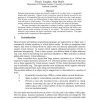Free Online Productivity Tools
i2Speak
i2Symbol
i2OCR
iTex2Img
iWeb2Print
iWeb2Shot
i2Type
iPdf2Split
iPdf2Merge
i2Bopomofo
i2Arabic
i2Style
i2Image
i2PDF
iLatex2Rtf
Sci2ools
114
click to vote
POS
1992
Springer
1992
Springer
Supporting Large Persistent Stores using Conventional Hardware
Persistent programming systems are generally supported by an object store, a conceptually infinite object repository. Objects in such a repository cannot be directly accessed by user programs; to be manipulated they must be fetched from the object store into virtual memory. Thus in these systems, two different kinds of object addresses may exist: those in the object store and those in virtual memory. The action of changing object store addresses into virtual memory addresses has become known as pointer swizzling and is the subject of this paper. The paper investigates three approaches to pointer swizzling: a typical software address translation scheme, a technique for performing swizzling at page fault time and finally a new hybrid scheme which performs swizzling in two phases. The hybrid scheme supports arbitrarily large pointers and object repositories using conventional hardware. The paper concludes with a comparison of these approaches.
Related Content
| Added | 10 Aug 2010 |
| Updated | 10 Aug 2010 |
| Type | Conference |
| Year | 1992 |
| Where | POS |
| Authors | Francis Vaughan, Alan Dearle |
Comments (0)

